Hist
33D, L 4: The 1920s: Golden or Leaden?
by Prof. H. Marcuse, UCSB, Oct. 2, 2003
Overarching questions: Were the 1920s good (golden) years,
or bad (leaden)?
Longer term (see films): Did the Nazi movement "force" itself on the German
people, or was it very popular?
- Weimar Republic, 1924-29: Golden?
- 1934 as a turning point (film clips)
- How Hitler fits in
Textbook p. 15: discussion of quotation
The 1920s in Germany
- 1925-29: economically stable, but textbook implies impending collapse
- "Social peace agreed at the end of 1918 between trade unions and industrialists"
- "Burgfrieden:" peace in the castle
- the prince and subjects aren't at odds
1924-29: Golden Years?
- 1925 Hindenburg election: reversal of republican values?
- Reichspresident: symbolic head of state
Reichstagspresident: house majority leader
Chancellor: head of gov't (US president)
- Reichspres. Ebert (SPD) died suddenly in 1925
- Loebe: Reichstagspresident, refuses offer to run for R.president
in 1925, succeeded as Rtp. by Göring in 1932
- new election for RP in 1925: first round no majority
- second round: center-right unites behind Hindenburg
- Noske: Secretary of the Army (SPD), put down sailors' mutiny in 1918,
put down revolutionary strikes by KPD in Jan. 1919; was friendly with army
- G. Grosz satire, 1925 (textbook p. 14), image at right
"Flaws of Weimar"?
- Hindenburg actually quite democratic
- Germany joined League of Nations: great success
- Economic success: good years
- hyperINFLATION 1923: money worth nothing
- DEPRESSION 1930: money very dear
- role of economics in history (future: EIEIO mnemonic about causality)
Mein Kampf (My Struggle): Hitler's autobiography, vol. 1 in
1924
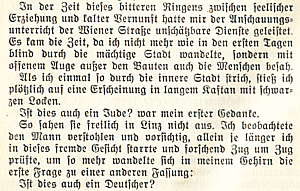 "In
this time of bitter wrestling between educating my soul and cold rationality
the Vienna streets did me an invaluable service by giving me a concrete lesson.
The day arrived when I wasn't wandering the streets of the mighty city overwhelmed
anymore, but took in not only the buildings but also the people.
"In
this time of bitter wrestling between educating my soul and cold rationality
the Vienna streets did me an invaluable service by giving me a concrete lesson.
The day arrived when I wasn't wandering the streets of the mighty city overwhelmed
anymore, but took in not only the buildings but also the people.
Once while I was walking through the city I suddenly encountered an appearance
in a long black robe with black curls.
Is this also a Jew? was my first thought. They hadn't looked like that in Linz.
I covertly and cautiously observed the man, but the longer I stared at this
strange face and questioningly examined it feature after feature, the more the
first question changed in my mind to another version:
Is this also a German?"
(see also this scan from the same chapter 2 pages before, with Hitler's description
of his first encounters with the term "Jew" in his childhood: Mein
Kampf on Jews pp. 54f [1931 German edition])
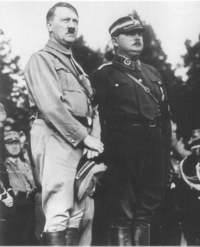 Hitler
and Röhm
Hitler
and Röhm
- Nazi party was a diverse organization
- Hitler wasn't the only popular leader
- The army was very suspicious of the SA
- Rudolf Hess (1894-1987)
- involved in 1923 Putsch
- sentenced to Landsberg, too
- became fast friends with Hitler, "secretary"
- captured in May 1941 in Scotland
- not the same as Rudolf Höss (1900-1945)
Film clips
- 5:20 from "Wonderful, Horrible Life"
- re: Riefenstahl's "first (political) film"
- Sept. 1933 Nazi Party rally "Victory of Faith"
- Roehm assassinated June 30, 1934
- Party "boycotted filming"
- 2 speeches from "Triumph of the Will"
- remembering Hindenburg (died Aug. 2, 1934)
- greeting the army
- not permanent revolution
How Hitler fits in, I: Intentionalism
- Holocaust was Hitler's preformed plan
- corresponds to idea that National Socialism was a coherent ideological program
as set out by Hitler (and other leaders)
- Hitler knew already in 1920-22 that he wanted to murder all Jews, and worked
to realize that goal
- Later reading by Goldhagen based on a variant of this view
How Hitler fits in, II: Structuralism
- nature of power structure
- dual pyramids of state vs. party administration
- corresponds roughly to the definition of NS as a variant of a political
worldview common at the time (fascism; reaction to "modernity")
- political science approach
How Hitler fits in, III: Functionalism
- widespread opportunistic behavior radicalized policy, needs of moment, "twisted
road"
- "polycratic"
- National Socialism: the sum of the beliefs of its adherents
- persuaded or convinced?
- propaganda/indoctrination?
- emphasizes role of individual behavior (psych)
prepared for web by H. Marcuse, Oct. 5, 2003
back to top, Hist 33d homepage
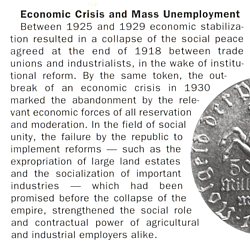
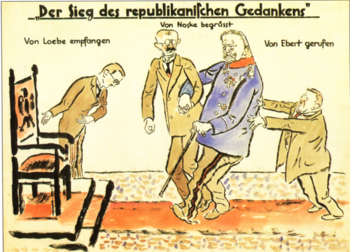
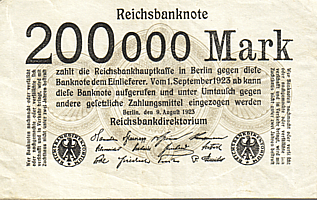


 "In
this time of bitter wrestling between educating my soul and cold rationality
the Vienna streets did me an invaluable service by giving me a concrete lesson.
The day arrived when I wasn't wandering the streets of the mighty city overwhelmed
anymore, but took in not only the buildings but also the people.
"In
this time of bitter wrestling between educating my soul and cold rationality
the Vienna streets did me an invaluable service by giving me a concrete lesson.
The day arrived when I wasn't wandering the streets of the mighty city overwhelmed
anymore, but took in not only the buildings but also the people. Hitler
and Röhm
Hitler
and Röhm